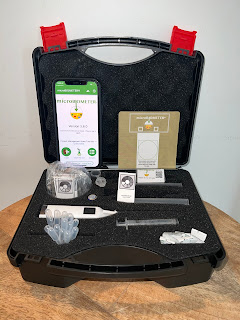How a Soil Health Test Kit Saves Water and Fertilizer
Rising costs of
water and fertilizer, combined with environmental concerns, have made efficient
resource management a critical priority. A soil health test kit emerges as a powerful solution that helps growers make
informed decisions, ultimately saving both water and fertilizer while improving
crop performance.
Precision
Agriculture Through Data-Driven Decisions
Modern soil health test kits enable precision
agriculture by providing detailed information about specific field conditions.
Instead of applying uniform amounts of water and fertilizer across entire
fields, growers can adjust their inputs based on actual soil conditions in
different zones.
This targeted
approach prevents over-application in areas where soil already contains
adequate nutrients or moisture-holding capacity.
For example,
areas with higher organic matter content typically retain water longer,
requiring less frequent irrigation. Similarly, zones with active microbial
populations often have better nutrient cycling, reducing fertilizer needs.
Water
Conservation Through Enhanced Soil Function
Healthy soil acts
like a natural sponge, holding moisture longer and reducing irrigation
frequency. A soil health test kit
reveals the biological activity levels that contribute to improved soil
structure and water-holding capacity.
Soils with
diverse microbial communities typically have better aggregation, creating pore
spaces that hold water while allowing excess moisture to drain properly. When
farmers understand their soil's water-holding capacity through testing, they
can adjust irrigation schedules to match actual needs rather than following
predetermined watering routines.
This precision
prevents both water waste and the problems associated with over-watering, such
as nutrient leaching and root diseases. Testing also identifies areas where
soil compaction or low organic matter limits water infiltration..
Optimizing
Fertilizer Applications for Maximum Efficiency
Traditional
fertilizer programs often follow standard recommendations that may not match
specific soil conditions. A soil health
test kit provides the information needed to customize fertilizer
applications based on actual soil biology and nutrient cycling capacity.
Active soil
microbial communities release nutrients from organic matter and improve plant
nutrient uptake through beneficial relationships with plant roots. When testing
reveals high biological activity, farmers can often reduce synthetic fertilizer
applications because the soil ecosystem naturally provides more plant-available
nutrients.
Economic Benefits
and Return on Investment
The initial
investment in a soil health test kit
typically pays for itself through reduced input costs within the first growing
season. Many growers report fertilizer savings of 20-30% and water usage
reductions of 15-25% after implementing soil health-based management
strategies.
Beyond immediate
cost savings, improved soil health creates compounding benefits over time.
Healthier soils support stronger plants that resist pests and diseases more
effectively, reducing the need for additional chemical inputs. The enhanced
water and nutrient efficiency also leads to more consistent yields, providing
greater financial stability.
Building
Sustainable Agricultural Systems
A soil health test kit serves as the
foundation for building truly sustainable agricultural systems that balance
productivity with environmental stewardship. By understanding and working with
natural soil processes, growers can reduce their environmental footprint while
maintaining or even improving their economic returns.
The reduced
fertilizer applications possible through soil health management decrease the
risk of nutrient runoff into waterways, protecting local ecosystems. Similarly,
improved water efficiency helps preserve this precious resource for future
generations while reducing operational costs.



Comments
Post a Comment